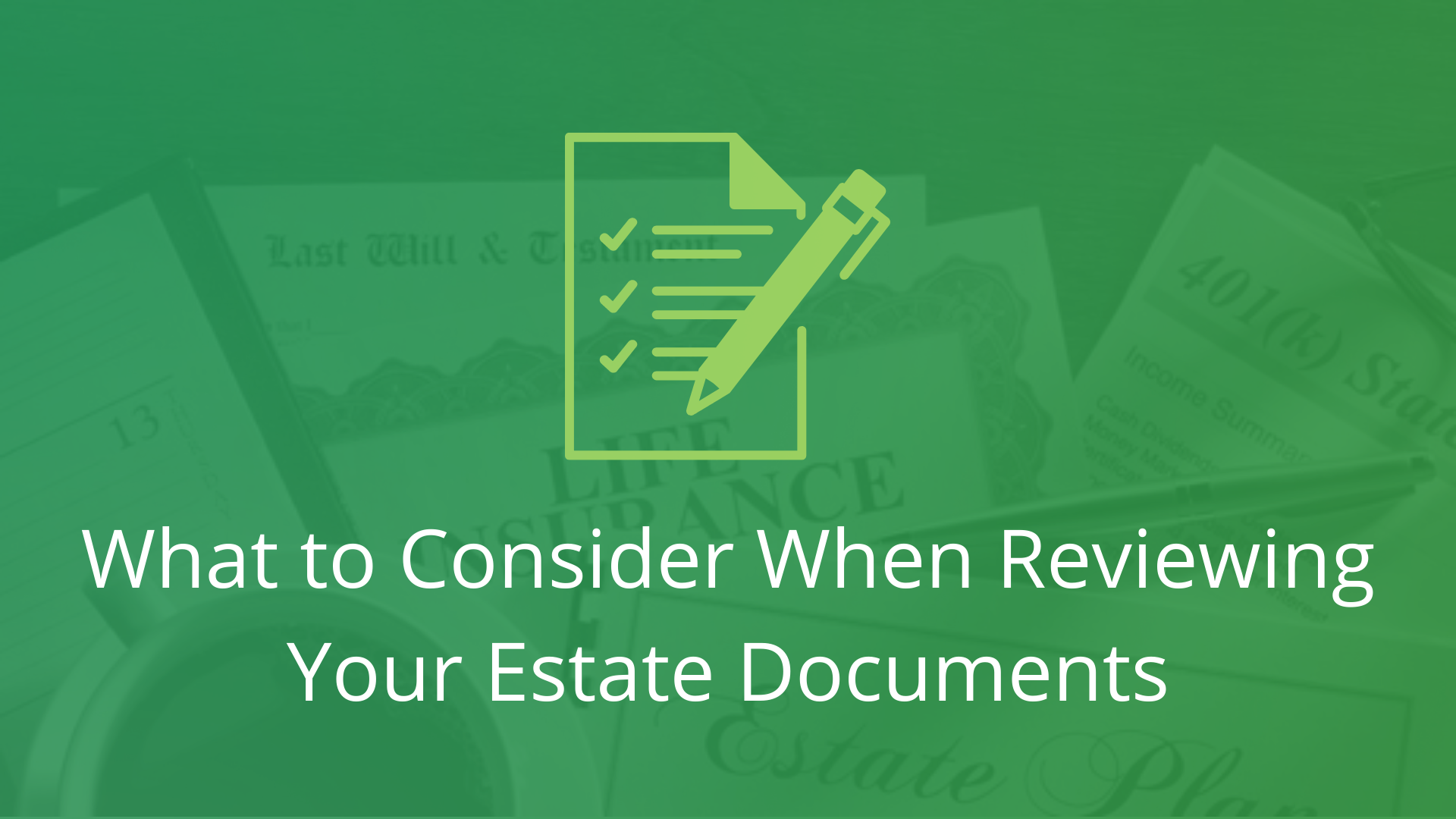 Like other parts of your financial life, estate planning is not a one-time event. There is no “set it and forget it” aspect to it since our lives and laws are constantly changing. Your estate plan needs to be reviewed regularly to make sure those changes are appropriately incorporated and that they line up with current laws. This can be a daunting task to review and it is easy to skip over considerations that should be made. The best place to start is to ask yourself some questions as you review these documents:
Like other parts of your financial life, estate planning is not a one-time event. There is no “set it and forget it” aspect to it since our lives and laws are constantly changing. Your estate plan needs to be reviewed regularly to make sure those changes are appropriately incorporated and that they line up with current laws. This can be a daunting task to review and it is easy to skip over considerations that should be made. The best place to start is to ask yourself some questions as you review these documents:
1. Did your residency change?
It is important to know that the probate process varies among states. If you moved across a state line it is best to connect with an estate attorney in the new state to see what changes need to be made to your documents. Additionally, if you purchased property in another state you don’t reside in you’ll need to review if you need additional estate documents to ensure that is handled appropriately in the event of death or incapacitation.
2. Did you have a big family or relationship event occur?
Whether you got married or divorced, had your first child or first grandchild, or lost a loved one that should be kept in mind while reviewing your estate documents. Was that incorporated in your will? Maybe you made provisions for children before having them and need to evaluate that those are still best for your family. This can also include considering if any charities listed are still the one(s) you desire to support, or if there is a close friend you want to make sure is included. Look for places your estate documents don’t line up with your current relationships with people or organizations, and make note to update those as needed.
3. Did something change with your beneficiaries?
This is a great time to revisit who you’ve listed as your beneficiaries and consider if anything has changed with them or if you have new perspective on how they may interact with money. Does your will have considerations for minor children? Do you need to include a special needs trust? Maybe your children have since grown up and become mature about money and that isn’t reflected in your estate plan. Whatever changes may have occurred since drafting your documents need to be considered in your review.
4. Did you have a big change in net worth?
Maybe you received a big windfall recently and your estate has the possibility of running into an estate tax issue. You could have concerns about your beneficiaries receiving a sizeable amount of assets at once. Those could be indicators that your estate plan needs revisiting. Likewise, maybe you’ve spent down a lot of your assets over the course of time and the current level of complexity in your estate plan isn’t necessary any longer.
5. Are the agents you chose still appropriate?
Consider any appointments you made: Executor, Power of Attorney, Guardian, Trustee, etc. and ask yourself if they are still the best person for the job. Do they fully understand what the role would entail? Don’t forget to revisit any successors listed for these agents as well.
6. What has changed outside of your personal situation?
We know that tax laws are always evolving, and your estate plan should as well. Consider if any changes have occurred in regard to estate planning or tax treatment of accounts, cost basis, etc. since executing your estate documents. It may be time to make an amendment to properly account for updates.
7. Have a safe but accessible place for the original documents and do the right people know where to find them?
Your agents such as your listed power of attorneys, executor, guardians, etc. should know how to access the original documents if needed. The place should be safe and secure but should be accessible to those who may need them if a situation arises. This is also a great time to double check that all your documents have been signed and executed correctly.
8. Have you confirmed your account registration and beneficiaries are in line?
Are your beneficiaries on your retirement accounts set to match your estate plan? If applicable, make sure any testamentary trusts are included as beneficiaries as needed. Your estate attorney and financial advisor can help make sure this is done appropriately. Do you need to re-title any of your accounts from to joint tenants with rights of survivorship or vice versa? Is it appropriate for you to add a “TOD” or “POD” provision to brokerage or bank accounts? These registration types and beneficiary designations will supersede your Will so it is important to make sure they match your estate plan.
If you’ve made it through your review noting all the areas that may need updating or at least if any items warrant a question to your estate attorney or financial planner now is the time to connect with them and make sure it is addressed properly. List most things, execution is the most important part. Once any questions are settled or updates have been made, don’t forget to schedule a time for your next estate plan check in!

